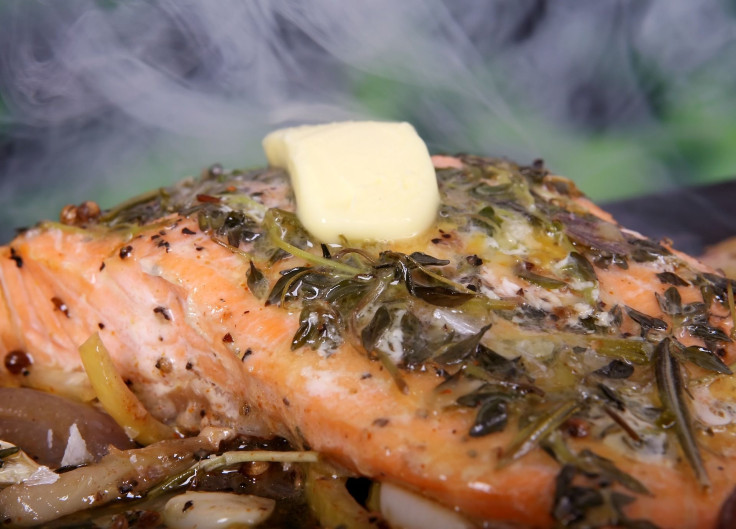5 Health Myths And Facts: The Science Behind Catching Colds And Eating Fats

You’ve probably heard all those old wives’ tales from your parents or grandparents — getting rained on will make you sick, and warm milk will help you sleep at night. If you’re like most people, you probably have dozens of these tricks and tales bouncing around in your head — but are any of them true? To help you separate truth from fiction, we’ve debunked the top five most common medical myths.
1. Gluten Free = Healthy
There are dozens of foods being labeled as gluten free every single day, even if they wouldn’t even contain gluten in the first place — deli turkey, for instance, sometimes has a gluten-free label on it! With all of these new, and old, products coming out of the gluten-free closet, the question remains: Is gluten free actually healthier for you?
Unless you have celiac disease or are sensitive to gluten, eaten gluten free isn’t any healthier for you than eating regular foods that contain gluten. Plus, cutting out gluten doesn’t mean you’re cutting out the carbs and sugars that come with bread and other baked goods, so don’t expect it to help you lose weight, either.
Your best bet, if you aren’t gluten sensitive, is to just enjoy that gluten.
2. Bad Fat
Fat is bad for you, right? It has to be, otherwise there wouldn’t be so many fat-free and low-fat options, and weight loss plans wouldn’t be encouraging us to cut fat out of our diets to drop a few pounds. In reality, though, not all fat is bad fat, and some fats can actually be good for you.
There are four different types of fats to consider when looking at the types of foods you consume:
- Monounsaturated Fats
- Polyunsaturated Fats
- Trans Fats
- Saturated Fats
Trans fats, as you know if you’ve watched any television in the last 10 years, are the ‘bad fats,’ and they should be avoided.
The unsaturated fats, mono and poly, are known as "good fats." These are the fats you’ll find in avocados in their monounsaturated form as well as in fatty fish, like salmon, in their polyunsaturated form. Those omega-3 fatty acids that are so good for you are a form of polyunsaturated fat.
Saturated fats fall somewhere in the middle. There have been some theories that linked high levels of saturated fat with heart disease, but no definitive link has been made. At this point, science has not determined if this type of fat is good or bad for you. The best rule of thumb in this case is always enjoy everything in moderation.
3. Spot Train for Killer Abs
Everyone knows that if you want abs, you need to do thousands of crunches and sit ups, right?
While you do need to work the muscles in a specific area to strengthen them, such as doing sit ups for your abs, you’re not going to see a lot of progress if you have a layer of fat over those muscles. That’s because you can’t spot-train to burn fat, and that’s what you need to really need if you want to show off those rock-hard abs.
You could have a set of rock-hard abs, but if you skip your cardio workout, you’ll never see them. A good cardio workout burns fat from your entire body, not just a single spot. So, if you really want to showcase your six-pack abs, be sure your workouts include fat burning as well.
4. Organ Donation Is Dangerous
There are many myths and misconceptions about organ donation in the United States.
Some believe that being an organ donor is dangerous to your health and can be deadly if there is miss-interpreted mortality, leading to improper removal. The truth is, organ removal cannot be considered until a patient is pronounced dead, and doctors actually run additional tests (free of charge) on those who are organ donors, in order to ensure there isn’t a serious mix up.
While organ donation is a controversial topic among some, it is completely a personal decision. However, it is important to be well-informed before deciding where you stand.
5. Wet Hair = Catching Cold?
Everyone has probably heard this at least once — the myth that leaving the house with wet hair when it’s chilly outside will result in you coming down with a cold.
While, depending on the temperature, you may end up with icicles for hair, you won’t end up catching a cold or the flu because you left the house right after taking a shower — unless you’re already sick, that is.
If you’re healthy and don’t have a cold virus lurking around in your system, then leaving the house with wet hair won’t cause any problems at all.
On the other hand, if you’ve already picked up that cold virus during your wanderings, the cooler temperatures can provide the perfect environment for the virus that’s already present to take hold and set you up for a rather unpleasant week or two.
So, don’t worry about leaving the house with wet hair. It’s not going to make you sick — if you’ve already picked up a cold virus, there’s nothing that will stop you from getting sick anyway.
Conclusions
Hopefully, these debunked myths have left you a little bit smarter and a little more informed. Do you have any other myths you would like us to explore? Let us know in the comments below.
Bio:
Corinne Keating is a health writer and enthusiast. She loves a good read, a long run, and writing for her blog Why So Well.



























